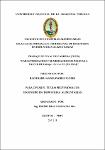| dc.contributor.advisor | Díaz Sangama, Emilio | |
| dc.contributor.author | Flores Flores, Nadia | |
| dc.date.accessioned | 2017-02-14T15:19:45Z | |
| dc.date.available | 2017-02-14T15:19:45Z | |
| dc.date.issued | 2015 | |
| dc.identifier.uri | http://repositorio.unapiquitos.edu.pe/handle/20.500.12737/3928 | |
| dc.description.abstract | En el presente trabajo de investigación se trabajó con la materia prima “Euterpe
oleracea M.” (Huasai), donde se caracterizó la materia prima, tanto fisicoquímico
en base húmeda, la cual reporto: humedad: 41.75g, energía: 238.73kcal, grasas
totales: 2.17g, proteínas totales: 4.89g, carbohidratos totales: 49.91g, sólidos
solubles: 4.10°Brix, cenizas totales: 1.28g, pH (25o C): 4.20 y materia seca: 58.25g.
Los análisis en base seca fueron: proteínas totales: 14.78g, grasas totales: 12.53g,
cenizas totales: 4.11g, carbohidratos totales: 68.58g, energía total: 446.21kcal,
teniendo una humedad: 43.34g. Siendo el flujo de proceso como sigue: materia
prima,selección/clasificación, lavado/pesado, maduración, pulpeado/refinado,
mezcla de insumos (formulación F3), moldeado/paletera, congelación,
separación de los moldes, almacenaje (1), sellado y almacenaje (2). Una vez que
se obtuvo la formulación ideal que fue obtenido por una degustación sensorial
(25 panelistas), se caracterizó por medio del análisis fisicoquímico los cuales
reportaron: humedad: 67.72g, cenizas totales: 0.52g, grasas totales: 1.17g,
proteínas totales: 3.33g, carbohidratos totales: 27.26g, solidos solubles: 12.00
oBrix, calorías: 132.89 kcal, sólidos totales: 32.28 g, acidez titulable(Ac. Láctico):
0.31%. Los reportes de los análisis microbiológicos fueron: Aerobios mesófilos:
7.2x102 ufc/g a 35°C, Coliformes totales: <3 NMP/g a 35oC, Staphylococcus
aureus: <10 ufc/g, Salmonella sp: Ausencia en 25 g. Los resultados
organolépticos /sensoriales fueron: color: 3.20, 3.30, 4.88, olor: 3.10, 3.10, 4.86,
sabor: 3.05, 3.20, 4.90 y apariencia general: 3.00, 3.10, 4.70, siendo las
formulaciones F1, F2 y F3. En cuanto a las pruebas estadísticas, donde se aplicó
el análisis de varianza a las tres formulaciones no existió diferencia
significativa. Así mismo se determinó los puntos críticos de control y por último
el cálculo de rendimiento. | es_PE |
| dc.description.abstract | In this research we worked with the raw material "Euterpe oleracea” (Huasai), where the raw material, both physicochemical wet basis, which was characterized reported humidity: 41.75g, energy: 238.73kcal, fats Total: 2.17g, total protein: 4.89g, total carbohydrates: 49.91g, soluble solids: 4.10 °Brix, total ash 1.28g, pH (25°C): 4.20 and dry matter: 58.25g. Analyses were dry basis: total proteins: 14.78 g, Total Fat: 12.53g, total ash 4.11g, total carbohydrates: 68.58g, total energy: 446.21kcal, taking humidity: 43.34g. As the process flow as follows: raw materials, sorting / grading, washing / heavy, maturation, pulping / refined mix of inputs (formulation F3), molding / paletera, freezing, separation of the molds, storage (1), sealing and storage (2). Once the ideal formulation was obtained by a sensory tasting (25 panelists) was obtained, it was characterized by the physicochemical analysis which reported: humidity: 67.72g, total ash 0.52g, total fat: 1.17g, total protein: 3.33g, total carbohydrates: 27.26g, soluble solids: 12.00 °Brix, Calories: 132.89 kcal, total solids: 32.28g,
titratable acidity (Lactic Ac.): 0.31%. Reports of microbiological analysis were:
total plate: 7.2x102 ufc/g at 35°C, Total coliforms: <3 NMP/g at 35°C, Staphylococcus aureus: <10 ufc/g, Salmonella spp: Absent in 25 g. Organoleptic / sensory results were: color: 3.20, 3.30, 4.88, smell: 3.10, 3.10, 4.86, flavor: 3.05, 3.20, 4.90 and overall appearance: 3.00, 3.10, 4.70, being the F1, F2 and F3 formulations. As for the statistical tests, where the analysis of variance was applied three formulations was no significant difference. Likewise, the critical control points and finally calculating yield was determined. | en_US |
| dc.description.uri | Tesis | es_PE |
| dc.format | application/pdf | es_PE |
| dc.language.iso | spa | es_PE |
| dc.publisher | Universidad de la Amazonía Peruana | es_PE |
| dc.rights | info:eu-repo/semantics/openAccess | es_PE |
| dc.rights | Attribution-NonCommercial-NoDerivs 3.0 United States | * |
| dc.rights.uri | http://creativecommons.org/licenses/by-nc-nd/3.0/us/ | * |
| dc.source | Universidad Nacional de la Amazonía Peruana | es_PE |
| dc.source | Repositorio institucional - UNAP | es_PE |
| dc.subject | Helados | es_PE |
| dc.subject | Elaboración de alimentos | es_PE |
| dc.subject | Huasai | es_PE |
| dc.subject | Euterpe Oleracea | es_PE |
| dc.title | Caracterización y elaboración de paletas a partir de Euterpe oleracea M. (huasai) | es_PE |
| dc.type | info:eu-repo/semantics/bachelorThesis | es_PE |
| thesis.degree.discipline | Ingeniería en Industrias Alimentarias | es_PE |
| thesis.degree.grantor | Universidad Nacional de la Amazonía Peruana. Facultad de Industrias Alimentarias | es_PE |
| thesis.degree.level | Titulo Profesional | es_PE |
| thesis.degree.name | Ingeniero en Industrias Alimentarias | es_PE |
| thesis.degree.program | Regular | es_PE |
| dc.subject.ocde | Alimentos y bebidas | es_PE |
| dc.subject.ocde | http://purl.org/pe-repo/ocde/ford#2.11.01 | es_PE |


